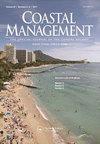Examining Institutional Arrangements toward Coordinated Regional Ocean Governance and Blue Economy Policy Development in the Caribbean Community (CARICOM)
IF 1.9
4区 环境科学与生态学
Q4 ENVIRONMENTAL SCIENCES
引用次数: 3
Abstract
Abstract Members of the Caribbean Community (CARICOM) exhibit strong economic, social and cultural connection with and dependence on the marine and coastal environment. Efforts to encourage the sustainable use and protection of the ocean and its resources should therefore be an area of interest and competence for the regional group which seeks to engender cooperation in matters of economic and social development. This paper examines the regionally relevant institutional arrangements that frame and execute ocean development and governance within CARICOM. It finds that while some important sectors, such as fisheries and tourism, have specific organizations established geared toward regional coordination in management of those activities, others, including offshore oil and gas, marine scientific research, and port and shipping development, lack similar arrangements. Additionally, the CARICOM group lags in adopting a holistic, ecosystem approach to ocean management with siloed approaches dominating and few formal mechanisms for intersectoral coordination existing. This paper advocates for and proposes means toward increased integration at a regional level for the management and continued governance of the marine space, its associated resources and activities. It also seeks to encourage the participatory development of a regional blue economy policy framework and strategy which would outline, among other things, CARICOM’s ocean vision and development priorities.审查加勒比共同体(加共体)协调区域海洋治理和蓝色经济政策发展的体制安排
摘要加勒比共同体(加共体)成员国与海洋和沿海环境有着密切的经济、社会和文化联系,并对其产生依赖。因此,鼓励可持续利用和保护海洋及其资源的努力应该是寻求在经济和社会发展问题上开展合作的区域集团感兴趣和主管的领域。本文件审查了在加共体范围内制定和执行海洋开发和治理的区域相关体制安排。报告发现,尽管渔业和旅游业等一些重要部门建立了专门的组织,旨在对这些活动进行区域协调管理,但其他部门,包括海上石油和天然气、海洋科学研究以及港口和航运发展,却缺乏类似的安排。此外,加共体集团在采用全面的生态系统方法进行海洋管理方面落后,各自为政,部门间协调的正式机制很少。本文主张并提出了在区域一级加强海洋空间及其相关资源和活动的管理和持续治理一体化的方法。它还寻求鼓励参与制定区域蓝色经济政策框架和战略,除其他外,该框架和战略将概述加共体的海洋愿景和发展优先事项。
本文章由计算机程序翻译,如有差异,请以英文原文为准。
求助全文
约1分钟内获得全文
求助全文
来源期刊

Coastal Management
环境科学-环境科学
CiteScore
6.00
自引率
0.00%
发文量
24
审稿时长
>36 weeks
期刊介绍:
Coastal Management is an international peer-reviewed, applied research journal dedicated to exploring the technical, applied ecological, legal, political, social, and policy issues relating to the use of coastal and ocean resources and environments on a global scale. The journal presents timely information on management tools and techniques as well as recent findings from research and analysis that bear directly on management and policy. Findings must be grounded in the current peer reviewed literature and relevant studies. Articles must contain a clear and relevant management component. Preference is given to studies of interest to an international readership, but case studies are accepted if conclusions are derived from acceptable evaluative methods, reference to comparable cases, and related to peer reviewed studies.
 求助内容:
求助内容: 应助结果提醒方式:
应助结果提醒方式:


